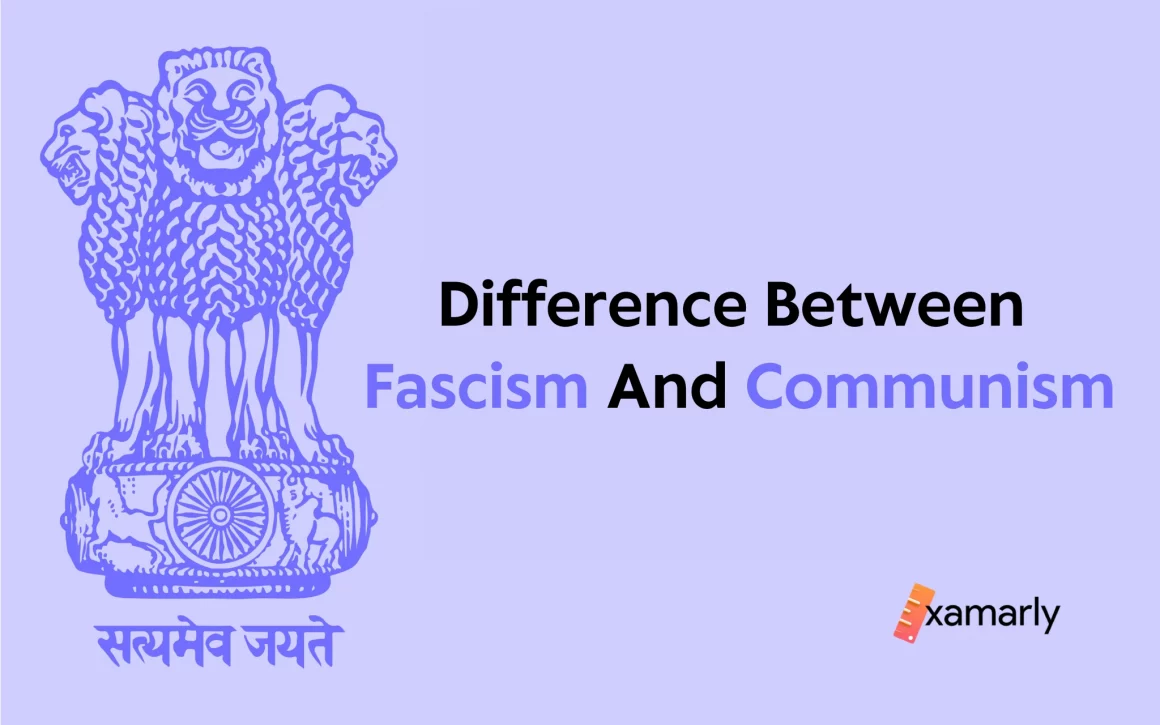Synopsis
The difference between fascism and communism is profound. Fascism and communism are two distinct political ideologies with different philosophies and approaches to government. While both ideologies have been implemented in different countries throughout history, they have distinct characteristics that set them apart.
Fascism is a form of government characterized by extreme nationalism, totalitarianism, dictatorial power, and suppression of political opposition.
On the other hand, communism is a political and economic ideology that aims to create a classless society where the means of production are owned and controlled by the community as a whole.
In this blog, we will explore the major difference between fascism and communism, including their origins, beliefs, and historical implementations.
- Synopsis
- What Is Communism?
- The Development Of Communism
- Communist Movement
- Effects Of Communism
- Major Countries That Implemented Communism
- What Is Fascism?
- The Development Of Fascism
- Fascist Movement
- Effects Of Fascism
- Major Countries That Implemented Fascism
- Fascism vs Communism: Similarities & Contrasts
- Summing Up
- Frequently Asked Questions
What Is Communism?
Communism is a political and economic system that envisions a classless society where the means of production are collectively owned and controlled by the community.
This ideology is also a form of socialism. The ultimate goal of communism is to establish a society where wealth, resources, and power are distributed equitably among all members, rather than being concentrated in the hands of a small ruling class.
Under communism, the government owns and controls the means of production and decides how resources are allocated. This is in contrast to capitalism, where private individuals and businesses own the means of production and operate for profit.
The Development Of Communism
The origins of communism can be traced back to the work of Karl Marx and Friedrich Engels in the mid-19th century. Their ideas were developed in the Communist Manifesto, published in 1848, which called for a revolution of the working class to overthrow the capitalist system and create a socialist society. These ideas were later implemented in the Soviet Union and other socialist states in the 20th century, though the implementation of communism in practice often diverged from its original principles.
Communist Movement
The communist movement refers to the political and social movement that aims to establish a communist society, characterized by the collective ownership and control of the means of production and the absence of social classes. The movement emerged in the late 19th and early 20th centuries, with Karl Marx and Friedrich Engels’ publication of “The Communist Manifesto” in 1848 being a seminal event.
Effects Of Communism
The effects of communism can vary depending on the specific implementation and context of the ideology. Communism supports both social and economic equality. Generally speaking, communism aims to create a classless society and promote economic and social equality. However, the implementation of communism has often led to a number of negative effects.
- Suppression of individual rights and freedoms: Under communism, the government holds significant control over the economy and society, which can lead to the suppression of individual rights and freedoms.
- Economic inefficiencies: The lack of incentives and competition under a centrally planned economy can lead to inefficiencies and a lack of innovation.
- Lack of political freedoms: Communist governments are often characterized by a lack of political freedoms, including free speech, free press, and free elections.
- Human rights violations: The suppression of political opposition and lack of individual rights can lead to human rights violations, such as forced labour and mass killings.
- Societal apathy: With the government controlling all aspects of society, citizens may become disengaged and apathetic towards their role in society.
It is important to note that the effects of communism can vary widely depending on the specific implementation and context, and some countries that have implemented communism have had different results and experiences.
Major Countries That Implemented Communism
Communist governments have been established in many countries throughout the world, some of the most notable examples include:
- Soviet Union: The first communist state in the world, established after the Bolshevik Revolution of 1917.
- China: The Chinese Communist Party came to power in 1949, and established the People’s Republic of China.
- Cuba: The Cuban Revolution of 1959 led to the establishment of the Communist Party of Cuba and a communist government.
- Vietnam: The Communist Party of Vietnam came to power in 1975, following the fall of South Vietnam.
- Eastern Europe: After World War II, several countries in Eastern Europe, such as Poland, Czechoslovakia, Bulgaria, Hungary and Romania, became communist states under Soviet influence.
- North Korea: The Communist Party of North Korea came to power in 1948, and established the Democratic People’s Republic of Korea.
- Laos: The Communist Pathet Lao came to power in 1975, and established the Lao People’s Democratic Republic.
- Mongolia: The Mongolian People’s Party came to power in 1924, and established the Mongolian People’s Republic.
It is worth noting that, these are some of the most notable examples, there are other countries that have also adopted communism as their official ideology, however to different degrees and with different results.
What Is Fascism?
Fascism is a political theory and form of government characterized by extreme nationalism, totalitarianism, dictatorial power, and suppression of political opposition. It is often associated with a strong authoritarian leader and a centralized, hierarchical government. The characteristics of Fascism emphasize loyalty to the state and the nation above individual rights and freedoms and often promote aggressive expansionism and militarism.
The Development Of Fascism
The origins of fascism can be traced back to the early 20th century, specifically the period following World War I. The term “fascism” comes from the Italian word “fascio,” meaning “bundle” or “group,” and was used to describe the political movement led by Benito Mussolini in Italy in the 1920s and 1930s. Fascism was also implemented in Nazi Germany under Adolf Hitler and has been adopted by other political movements around the world.
Fascism emerged as a reaction to the social and political changes brought about by industrialization and modernization, as well as the economic and political turmoil of the time.
Fascist Movement
The fascist movement refers to the political and social movement that aims to establish a fascist government, characterized by extreme nationalism, totalitarianism, dictatorial power, and suppression of political opposition. The fascist movement emerged in the early 20th century, with the rise of Benito Mussolini and his National Fascist Party in Italy in the 1920s being a seminal event.
The fascist movement has since been active in various countries around the world, with varying degrees of success. Fascist parties and governments have been established in many countries, including Italy under Mussolini, Nazi Germany under Adolf Hitler, and Spain under Francisco Franco.
Effects Of Fascism
The fascist movement can vary depending on the specific implementation and context of the ideology. Generally speaking, fascism is a political ideology that emphasizes extreme nationalism, totalitarianism, dictatorial power, and suppression of political opposition. However, fascist regimes have often led to a number of negative effects.
- Suppression of individual rights and freedoms: Under fascism, the government holds significant control over the economy and society, which can lead to the suppression of individual rights and freedoms.
- Economic inefficiencies: The lack of incentives and competition under a centrally planned economy can lead to inefficiencies and a lack of innovation.
- Lack of political freedoms: Fascist governments are often characterized by a lack of political freedoms, including free speech, free press, and free elections.
- Human rights violations: The suppression of political opposition and lack of individual rights can lead to human rights violations, such as forced labour and mass killings.
- Societal apathy: With the government controlling all aspects of society, citizens may become disengaged and apathetic towards their role in society.
- Promotion of racism, anti-Semitism and other forms of discrimination: Fascist ideologies often promotes a sense of national superiority and the exclusion of minority groups.
It is important to note that the effects of fascism can vary widely depending on the specific implementation and context and some countries that have implemented fascism have had different results and experiences.
Major Countries That Implemented Fascism
Fascist governments have been established in a number of countries throughout the world, some of the most notable examples include:
- Italy: National Fascist Party obtained power and established a Fascist government under Mussolini.
- Germany: The Nazi Party, led by Adolf Hitler, came to power in 1933 and established a fascist government in Germany.
- Spain: The Falange, led by Francisco Franco, came to power in 1939 and established a fascist government in Spain.
- Japan: The Imperial Rule Assistance Association, which had some fascist characteristics, came to power in Japan in the 1930s.
- Hungary: The Arrow Cross Party, led by Ferenc Szálasi, came to power in 1944 and established a fascist government in Hungary.
- Romania: The Iron Guard, led by Corneliu Zelea Codreanu, came to power in 1940 and established a fascist government in Romania.
- Portugal: The Estado Novo, led by António de Oliveira Salazar, came to power in 1933 and established a fascist government in Portugal.
It is worth noting that, these are some of the most notable examples, there are other countries that have also adopted fascism as their official ideology, however to different degrees and with different results.
Fascism vs Communism: Similarities & Contrasts
Fascism and communism are two political ideologies that emerged in the early 20th century and have been the subject of much debate and criticism.
Similarities:
- Both ideologies reject liberal democracy and capitalism and call for a strong centralized government.
- Both ideologies seek to create a classless society, where wealth and resources are distributed more equally.
- Both ideologies promote a strong sense of national unity and pride.
Contrasts:
- Fascism emphasizes nationalism and racist ideologies, often promoting the idea of a superior race or nation. Communism, on the other hand, is based on the idea of class struggle and the elimination of social classes.
- Fascism is often associated with authoritarian and militaristic regimes, while communism is associated with socialist and democratic regimes.
- Fascism promotes private ownership and control of the means of production, while communism calls for the collective ownership of the means of production.
It’s important to note that both fascism and communism have been implemented in a variety of ways and have been associated with different policies, practices and governments. And these ideologies have led to human rights violations and mass killings in the past.
Comparison Between Communism And Fascism – 7 Key Factors
| Concept | Fascism | Communism |
|---|---|---|
| Economic system | Capitalism | Socialism |
| Role of government | Totalitarian | Totalitarian |
| Individual rights | Restricted | Restricted |
| Leader | Strong leader | Collective leadership |
| Nationalism | Strong emphasis | Little emphasis |
| Private property | Limited | Abolished |
| Distribution of wealth | Unequal | Equal |
Summing Up
In summary, Fascism and communism are contrasting political ideologies with distinct philosophies and methods of governance. Both ideologies have been implemented in various countries throughout history, however, they possess unique characteristics that differentiate them. Fascism is a form of government characterized by extreme nationalism, totalitarianism, dictatorial power, and the suppression of political opposition.
On the other hand, Communism is a social and economic ideology that aims to establish a society without class distinctions, where the means of production and distribution are owned and controlled collectively by the community. This system aims to create a classless society where resources are shared equally among all citizens, eliminating the need for a capitalist class that owns the means of production. The ultimate goal of communism is to abolish private property and establish a society where resources are shared equally among all citizens.
Both ideologies have had a significant impact on world history and have resulted in different effects on the societies they have been implemented in. It is essential to understand the fundamental differences between these ideologies to fully comprehend their impact on the world.
Take a look at our latest posts:
Article 243 Of The Indian Constitution
Article 355 Of The Indian Constitution
Frequently Asked Questions
What is the major contrast between fascism and communism?
The main difference between fascism and communism is that fascism is a form of government characterized by extreme nationalism, totalitarianism, dictatorial power, and suppression of political opposition, while communism is a political and economic ideology that aims to create a classless society where the means of production are owned and controlled by the community as a whole.
Which countries have implemented fascism in the past?
Fascist governments have been established in many countries in the past, including Italy under Benito Mussolini, Nazi Germany under Adolf Hitler, and Spain under Francisco Franco.
Which countries have implemented communism in the past?
Communist governments have been established in many countries in the past, including the Soviet Union, China, Cuba, and Vietnam.
What are some of the negative effects of fascism?
Some of the negative effects of fascism include suppression of individual rights and freedoms, economic inefficiencies, lack of political freedoms, human rights violations, societal apathy, and promotion of racism and discrimination.
What are some of the negative effects of communism?
Some of the negative effects of communism include suppression of individual rights and freedoms, economic inefficiencies, lack of political freedoms, human rights violations, and societal apathy.
What is the Communist movement?
The Communist movement refers to the political and social movement that aims to establish a communist society, characterized by the collective ownership and control of the means of production and the absence of social classes.






